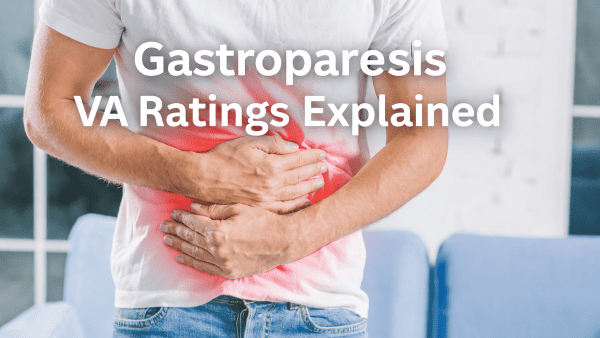Looking for Expert-Level VA Claim Answers?📱Call Us Now! 737-295-2226
You may be eligible for a VA rating for insomnia secondary to tinnitus if you can prove your service-connected tinnitus caused your insomnia.
Many veterans experience sleepless nights due to the persistent ringing or buzzing in their ears, a condition commonly linked to military service.
Fortunately, the VA recognizes insomnia as a secondary condition to tinnitus, which means you could qualify for additional disability benefits.
In this post we will take a closer look at:
- How the VA rates insomnia secondary to tinnitus
- How to prove service connection
- The value of a nexus letter, and more!
Let’s get started.
Table of Contents
Summary of Key Points
- VA Rating for Insomnia Secondary to Tinnitus: Insomnia caused by tinnitus can be rated as a secondary condition, and veterans may be eligible for additional disability benefits based on the severity of their symptoms.
- How the VA Rates Insomnia: The VA uses the General Rating Formula for Mental Disorders to assess insomnia, with ratings ranging from 0% to 100% based on the impact on work and social life.
- Proving Service Connection: To receive benefits, veterans must provide medical evidence linking their insomnia to their service-connected tinnitus, often supported by a strong nexus letter.

The Link Between Insomnia and Tinnitus
Tinnitus is the perception of ringing, buzzing, or other noises in the ears without an external sound source. The constant noise can make it difficult to relax or fall asleep, leading to insomnia.
One study from 2020 found that patients with tinnitus also suffered from severe insomnia symptoms. In addition, 60% of those tinnitus patients met strict diagnostic criteria of insomnia secondary to tinnitus.
The data suggests that tinnitus patients with co-morbid insomnia have a more severe form of tinnitus and, thus, may need further care and treatment.
Medical Research Studies:
Insomnia in Tinnitus Patients: A Prospective Study Finding a Significant Relationship
BVA Case History Example:
Service Connection for Insomnia Secondary to Tinnitus Granted
How the VA Rates Insomnia Secondary to Tinnitus
The VA rates insomnia secondary to tinnitus under the General Rating Formula for Mental Disorders.
It’s important to note that insomnia doesn’t have its own diagnostic code (DC) under the general rating schedule.
Therefore, because the symptoms of insomnia are most closely related to mental disorders, insomnia is rated “analogous” to mental disorders, which have ratings of 0%, 10%, 30%, 50%, 70%, or 100%.
Your insomnia secondary to tinnitus VA rating will depend on the severity, frequency, and duration of your symptoms, including your level of occupational and social impairment.
VA Rating Scale for Insomnia Secondary to Tinnitus
| General Rating Formula for Mental Disorders | VA Rating |
| Total occupational and social impairment, due to such symptoms as: gross impairment in thought processes or communication; persistent delusions or hallucinations; grossly inappropriate behavior; persistent danger of hurting self or others; intermittent inability to perform activities of daily living (including maintenance of minimal personal hygiene); disorientation to time or place; memory loss for names of close relatives, own occupation, or own name. | 100% |
| Occupational and social impairment, with deficiencies in most areas, such as work, school, family relations, judgment, thinking, or mood, due to such symptoms as: suicidal ideation; obsessional rituals which interfere with routine activities; speech intermittently illogical, obscure, or irrelevant; near-continuous panic or depression affecting the ability to function independently, appropriately and effectively; impaired impulse control (such as unprovoked irritability with periods of violence); spatial disorientation; neglect of personal appearance and hygiene; difficulty in adapting to stressful circumstances (including work or a worklike setting); inability to establish and maintain effective relationships. | 70% |
| Occupational and social impairment with reduced reliability and productivity due to such symptoms as: flattened affect; circumstantial, circumlocutory, or stereotyped speech; panic attacks more than once a week; difficulty in understanding complex commands; impairment of short- and long-term memory (e.g., retention of only highly learned material, forgetting to complete tasks); impaired judgment; impaired abstract thinking; disturbances of motivation and mood; difficulty in establishing and maintaining effective work and social relationships. | 50% |
| Occupational and social impairment with occasional decrease in work efficiency and intermittent periods of inability to perform occupational tasks (although generally functioning satisfactorily, with routine behavior, self-care, and conversation normal), due to such symptoms as: depressed mood, anxiety, suspiciousness, panic attacks (weekly or less often), chronic sleep impairment, mild memory loss (such as forgetting names, directions, recent events). | 30% |
| Occupational and social impairment due to mild or transient symptoms which decrease work efficiency and ability to perform occupational tasks only during periods of significant stress, or symptoms controlled by continuous medication. | 10% |
| A mental condition has been formally diagnosed, but symptoms are not severe enough either to interfere with occupational and social functioning or to require continuous medication. | 0% |
You DESERVE a HIGHER VA rating.
Take advantage of a VA Claim Discovery Call with an experienced Team Member. Learn what you’ve been missing so you can FINALLY get the VA disability rating and compensation you’ve earned for your service.
How to Prove Service-Connection for Insomnia Secondary to Tinnitus
Before you can file a VA insomnia secondary to tinnitus claim, you must service-connect your condition.
A VA service connection for secondary conditions requires the following:
- A current medical diagnosis (documented in a medical record) of the secondary VA disability (insomnia) you’re attempting to link to the current service-connected disability (tinnitus) AND
- A current service-connected primary disability (tinnitus) AND
- Medical nexus evidence establishing a connection between the service-connected primary condition (tinnitus) AND the current disability you’re trying to connect secondary (insomnia)
Insomnia Secondary to Tinnitus Nexus Letter
A nexus letter establishes the connection between your service-connected tinnitus and the secondary condition of insomnia.
While not required, a strong nexus letter provides medical reasoning and a clear and professional opinion linking the two conditions.
Including a well-crafted nexus letter in your claim can significantly strengthen your case and improve the chances of receiving the appropriate VA rating for insomnia secondary to tinnitus.
Need a Nexus Letter for Your Secondary VA Claim?
Trying to get a high-quality Nexus Letter to help service-connect your secondary VA condition?
WE GOT YOUR SIX!
Veterans who become members of the VA Claims Insider Elite program can get access to our preferred provider network who can potentially write VA Nexus Letters at reduced rates.
Why pay $1,500 to $2,000 for a Nexus Letter when you can get one for 60-70% OFF through VACI’s preferred provider network?
Click HERE to book a date and time to speak with a VA claim expert (no-obligation, no high-pressure sales tactics) or call us right now at: 737-295-2226.

(FAQs) Frequently Asked Questions
What is the highest VA rating for insomnia secondary to tinnitus?
The highest VA rating for insomnia secondary to tinnitus is 100%, which is awarded due to total occupational and social impairment.
How common is insomnia in veterans?
Very common! The bottom line is many veterans don’t sleep well or hardly at all. There’s a joke in the veteran community that goes like this: “I once got 8 hours of sleep … it only took me 3 days.” But the truth is, insomnia is no laughing matter and can lead to all sorts of other problems.
Insomnia is a sleep disorder characterized by the inability to fall asleep, stay asleep, or both. This may cause you to still feel tired all the time.
Insomnia can drain your energy level, mood, health, work performance, and quality of life.
How does the VA evaluate insomnia secondary to tinnitus?
The VA evaluates insomnia secondary to tinnitus under the General Rating Formula for Mental Disorders since there is no specific diagnostic code (DC) for insomnia.
How does the VA rate tinnitus?
The VA rates tinnitus under 38 CFR § 4.87, Schedule of Ratings – Ear, Diagnostic Code 6260, with the highest rating of 10%.
How long does it take for the VA to decide an insomnia secondary to tinnitus claim?
As of November 2024, it takes an average of 139.3 days. Various factors can affect this, such as the type of claim you filed, the complexity of your claim, and how long it takes the VA to collect the necessary evidence to decide on your claim.
Related Guides
3 Ways to Get a VA Rating for Insomnia
How to Secure an Insomnia VA Rating
Top 10 VA Secondary Conditions to Tinnitus for Disability Benefits
Top 5 Secondary Conditions to Tinnitus
Top 100+ VA Disability List of Secondary Conditions
Want Expert-Level VA Disability Claim Help? WE GOT YOUR SIX!

- VA Claims Insider is the #1 most trusted name in VA disability claims.
- Work directly with a VA claims coach who can educate you to VA claim victory.
- 25,000+ disabled veterans served in our membership programs since 2016.
- 30% average rating increase for veterans who complete our #1 rated Elite program.
- 4.7/5.0 average rating out of 5,500+ total reviews; over 4,500 5-star reviews.

Kelly Olone
Kelly Olone is a military spouse who earned her degree in Psychology from Florida International University. After working in the non-profit sector for several years, she turned to her passion for writing. She aims to contribute to a better understanding of the valuable benefits that veterans deserve. As a mom, Kelly navigates the delicate balance between deadlines and bedtime stories with finesse.



